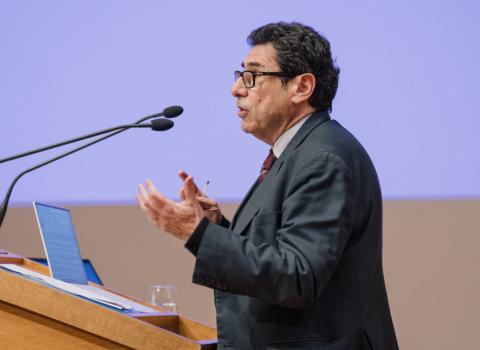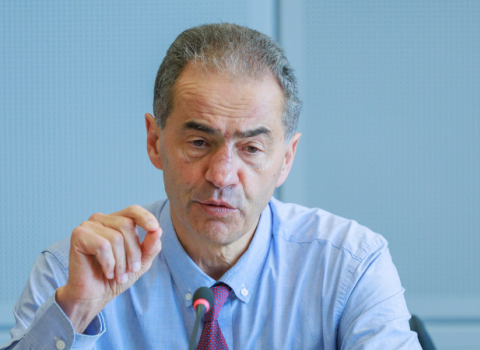Despite political pressure to spread its frontier research grants more evenly across the continent, the European Research Council (ERC) will continue to judge grant applications solely on their scientific merit. “We are not going to abolish our principle of excellence,” says ERC president Helga Nowotny, in an interview with Science|Business.
Newer EU member states like Bulgaria and Romania, in particular, need to increase national funding and reform their research institutions in order to generate more excellent output, Nowotny argues. “I encourage a better understanding of the fact that you need impartiality to evaluate and that you need a lot of expertise,” she says. Meanwhile, the ERC will keep bringing Europe’s “goldmine” of potential to light, says Nowotny.
Whilst Nowotny acknowledged that, “We are all concerned about the low percentage of ERC grantees in the new member states,” she said the ERC will not change its grant criteria to make it easier for underperforming member states to win more grants.
Founded five years ago, the ERC is modelled on the US National Science Foundation’s (NSF) no-politics method of awarding research grants based on scientific peer-review panels. There has been some political backlash in eastern and southern Europe, with the ERC currently awarding the majority of its grants to science-rich northwestern Europe.
Underfunding and a lack of transparency
Nowotny’s comments do not reflect a new position for the agency – but her remarks come in the middle of a hot political debate in Brussels over research funding and the gap between the haves and have-nots in European R&D. The European Commission has proposed a 46 per cent jump in overall research and innovation funding, to €80 billion, in the Horizon 2020 programme which will run from 2014-2020. Some of the money will be earmarked for specific EU programmes to help less-developed regions build their scientific capacities.
The ERC, which gets a fifth of the total budget, is at the far end of the spectrum in making excellence the sole criterion for awards. While the ERC enjoys huge political support now - and is perceived widely as a rare EU success story – its firm stand on the issue has also raised political hackles in the European Parliament, and among less-developed EU members.
The ERC has so far taken a number of soft measures in some of the newer member states, including an information campaign to make sure potential applicants are fully aware of the ERC’s funding opportunities. Nevertheless, Nowotny’s analysis is that the problem has to be solved by the underperforming members themselves – to start with, by spending more national funds on research. “We see a clear correlation between what a country spends on R&D and the number ERC grants. If you fall below 0.9 per cent of GDP [spending on R&D], there is a lack of infrastructure, a lack of critical mass and a lack of perspective for young people. They leave the country.”
“If you work in a research institution in Bucharest, the salary level is so low you practically need a second job. How much time can you then devote to research?” Nowotny asks. “What level of publications can you reach? The ERC evaluation includes the track record, and if their track record is very meagre, they don’t stand a chance.”
Stop a brain drain
Suggesting research institutions in some countries are not impartial enough to let the best research surface, Nowotny says reforms are needed to stop a brain drain from the new member states. “In some of these countries you still have an evaluation system which is not quite up to the standards of evaluation that you would want for frontier research.”
Reform of some of the national evaluation systems would be an important signal to the local scientific community, Nowotny believes. This would provide, “A signal [to young scientists] that they will be treated in a transparent and fair way, a signal to young people not to leave the country, because they can expect conditions where they will be treated on the basis of scientific merit.”
Nowotny highlights that the ERC’s Brussels based Executive Agency is open to receive visits from newer EU member states interested in observing how the agency works. Officials from Poland already came to Brussels to see the ERC selection panels at work.
At the moment, the ERC awards half of its grants to Germany, France and the UK alone – the acknowledged powerhouses of European science. As part of Europe’s main research funding scheme, Framework Programme 7 (FP7), the ERC currently wields a yearly budget of close to €2 billion - up from €300 million in 2007 - and is set to continue to do so under Horizon 2020 when it replaces FP7 in 2014.
In its first five years of existence, the ERC has awarded 2,500 grants to researchers and their teams. Only around 90 grantees are nationals from one of the newer member states, and 43 of those were based outside this part of Europe. A total of just over 50 grants are being carried out in the new member states.
The Polish example
Nowotny held up Poland as an example of how rapid progress is possible in attaining scientific excellence. Indeed, after a few years of political static from Warsaw, the Polish government’s attitude towards the ERC has evolved as its engagement has increased. Nowotny said, “It is interesting to see that they set up a new funding agency in Poland, modelled entirely [on] the ERC. The aim is to bring Polish pre-ERC grantees up to a level where they can compete at the ERC level.”
Jan Krzysztof Frackowiak, director of the Polish Science Contact Agency (PolSCA ) told Science|Business that he supports the ERC’s principle of excellence. “Poland supports without objections the ERC idea and activity, with quality and excellence as a unique criterion in an evaluation process.”
One measure to help newer member states develop their research potential that has been aired in the European Parliament is to allow the use of EU structural funds. This is a suggestion that Nowotny embraces. “One possibility would be to use more of the structural funds for building research infrastructures, and to channel them in ways that also benefits research and universities,” she says.
Frackowiak recognises this is a way to boost R&D spending in the newer member states. “We have spent roughly €2 billion of structural funds on R&D infrastructure in Poland during the last five years. The synergy potential is there.” Frackowiak does, however, suggest that the ERC itself could do more to reach out to the research community in eastern Europe. “The ERC could [provide] encourage[ment] by inviting the best scientists from the less R&D-intensive countries to compose or complete proposal-submitting groups. The benefits for European science, resulting from possible involvement of an excellent but not fully recognised scientific potential, seems to be obvious.”
Europe’s goldmine of potential
When asked when we will see the first big scientific discoveries made possible by the ERC, Nowotny points out the ERC is only five years old, and excellent research needs time. “Very often a Nobel Prize winner gets his award 40 years after the research was conducted,” she says. But there won’t be a 40 year-wait to see the first results of ERC-funded research. “Over the coming years we will see certain hotspots emerge in Europe. It is too early to tell at the moment, because only now are the first grantees finishing up their work. But I think that in five years’ time, you can point and say that something of world-class was started somewhere, that would not have started without the ERC.”
“I would like the general public in Europe, with the help of the media, to become much more conscious of the goldmine that we are bringing to light,” said Nowotny.
Involve industry to help commercialise technologies
The ERC has tried to involve Europe’s industry in its programmes, but has so far struggled to draw much interest, Nowotny says. “We had discussions with large industries, but they said very clearly, ‘look, the money in it not enough for us, also [there’s] too little in the sense that we can’t meet conditions such as letting the ERC decide who will get hired, based on excellence.’”
In the future, Nowotny expects more from smaller, high-tech companies. But the ERC hasn’t given up on big industry just yet, says Nowotny. Last year, the ERC launched its “proof of concept” top-up grants to help ERC grant holders to take the next steps towards bringing their ideas to market. “We would like industry to become more interested in technologies that are being developed in a lab to solve a specific scientific problem. But it takes an industrialist’s eye to discover things that could also be used outside the lab, for a different purpose,” Nowotny added.
Here, Nowotny says Europe should look at the US for practical examples. “This is what MIT, and many of the American research universities are great at, they have industrialists come in and see for themselves, and I would like to see more of that in Europe.” Nowotny pointed out that the food company Nestlé recently built a new lab on the EPFL campus in Lausanne. “It also happens in Europe, and we would like to see more of this happening around ERC grantees.”
Repairing Europe’s image abroad
When it comes to attracting scientific talent from outside Europe, Nowotny believes there is a lot of work to do. She speaks about a recent “shocking experience” on a trip to Singapore and New Zealand. “In both places the image of Europe was really dismal. It is seen as if everything is falling apart and in a state of crisis, Europe has no future. But I reassured my discussion partners that Europe certainly has the political will to invest in research and education.”
The ERC has recently kicked off an internationalisation campaign called ‘ERC goes global.’ to raise awareness overseas that Europe is “a wonderful place to come and work – it should communicate that people should come and see for themselves that Europe is not falling apart,” Nowotny concluded.





 A unique international forum for public research organisations and companies to connect their external engagement with strategic interests around their R&D system.
A unique international forum for public research organisations and companies to connect their external engagement with strategic interests around their R&D system.